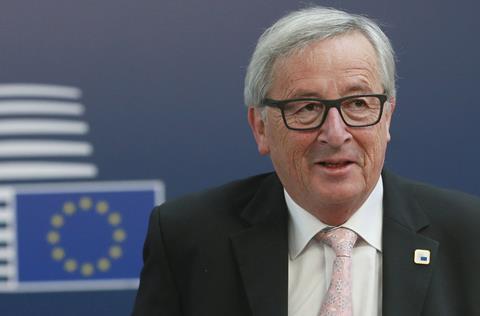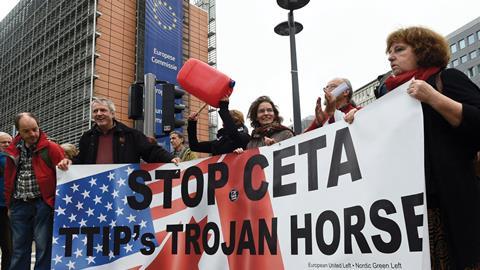Inter-state arbitration rules are the bogeymen of the anti-globalisation movement. So can the European Commission get shot of them? Not easily, writes Marialuisa Taddia
THE LOW DOWN
International investor-state arbitration has come in for fierce criticism for lacking transparency and fairness – and for making awards that weigh too heavily on the coffers of states, particularly emerging economies. The European Commission wants to scrap the system and replace it with a multilateral investment court with ‘highly qualified permanent and full-time judges, completely independent from investors and states’. But with the majority of international investment agreements, over 3,300 of them, containing an investor-state arbitration clause, the system is not without certain advantages, and abolition is fiendishly complex. Reforms are already under way and practitioners the Gazette spoke to say that modifying rather than abolishing the system is the best way forward – putting the system and the Commission on a collision course.
Hillary Clinton has called the regime governing investor-state arbitration (ISDS) ‘a fundamentally anti-democratic process’.And the European Commission’s president Jean-Claude Juncker has described the arbitral tribunal hearing investor-state disputes as ‘secret courts’ that should not be allowed to have ‘the final say’. The EU-Canada Comprehensive Economic and Trade Agreement (CETA) and the Transatlantic Trade and Investment Partnership (TTIP), and their ISDS provisions, have been the subject of multiple mass protests.
Partly in response to strong objections to ISDS by NGOs, trade unions and consumer groups, international arbitration has been replaced by an ‘investment court system’, that is made up of a tribunal and appellate body in the CETA and the EU-Vietnam free trade agreement. Both systems will then transition to a ‘multilateral investment court’ the Commission wants to create.
The backlash against the arbitration system is not confined within Europe – several emerging economies such as India, South Africa and Indonesia have decided not to renew bilateral investment treaties (BITs), or amended existing ones to reduce their liability to foreign investors. Brazil has not entered into any treaties with ISDS clauses, including in its recently negotiated BIT with India. In the new United States-Mexico-Canada Agreement, reached at the end of September, ISDS has been scaled back significantly.
ISDS allows foreign investors to make claims against governments before international arbitral tribunals (rather than the host country’s domestic courts) for treaty breaches, such as expropriation, contract/concession terminations, licence revocation or the denial of tax exemptions. ISDS first appeared in a 1959 treaty between Germany and Pakistan, but it was not until the late 1990s that the number of cases began to grow significantly.
WilmerHale London-based partner and international arbitration expert Steven Finizio says the sharp rise in ISDS has been down to ‘a combination of more foreign direct investment and more investment treaties… These mechanisms exist in the first place to encourage foreign direct investment’.
International investment agreements or IIAs – which include bilateral investment treaties and free trade agreements with investment chapters – have proliferated in the last 20 or so years and there are currently over 3,300. The World Bank mechanism, the International Centre for Settlement of Investment Disputes (ICSID), is incorporated into the majority.
So, while increasingly under challenge, the number of ISDS claims remains high. In 2017, there were at least 65 new ISDS cases, bringing the total to 855, as of January 2018. The majority of treaties invoked dated back to 1980s and 1990s, and included the Energy Charter Treaty and NAFTA. As confidentiality is a key feature of arbitration, the actual number of cases filed is probably higher.
So what do practitioners make of ISDS? Markus Burgstaller, an international arbitration partner at Hogan Lovells, highlights some of the positive aspects: ‘Historically, only states could bring actions against other states so that was from the perspective of public international law an innovative feature.
‘ISDS gives investors the right to seek remedies before an international tribunal, which is independent from the judiciary of the local state [which] the investor may not have a lot of faith in.’ Hence it has contributed to the development of ‘an international rule of law’.
Bar a few exceptions (most notably Spain) the most frequent respondent states, based on the number of known cases in 1987-2017, are developing and so-called ‘transition’ countries, such as Argentina, Venezuela (the top two), as well as the Czech Republic, Mexico, India and the Russian Federation, according to data from the United Nations Conference on Trade and Development (UNCTAD). By contrast, the most frequent home states of claimants are developed countries – chief among them the US, Netherlands, UK and Germany.
Other benefits include mechanisms to make reluctant states comply with awards, such as the New York Convention, or for ICSID cases, the ICSID Convention.
Yet, as Matthew Weiniger QC, Linklaters’ global co-head of international arbitration, observes: ‘There are a number of problems with the system which was put together piecemeal and creaks around the edges.’ One ‘fair’ criticism, he says, is that ‘very important decisions were happening behind closed door with no transparency. If the public purse is on the line everything should be done in a transparent way’.
Transparency is now being tackled, lawyers says. More case decisions and documents are published and more hearings are open to the public, including through broadcast video. For example, since April 2014 the transparency rules of the United Nations Commission on International Trade Law (UNCITRAL) automatically apply to all investor-state arbitrations conducted under the UNCITRAL rules (the second most commonly used in investor-state arbitrations) when these have been incorporated into treaties concluded on or after that date. Furthermore, since October 2017 under the new Mauritius Convention on Transparency the same transparency rules now apply to all investment treaties, provided the parties to the treaties consent to it.

COSTS - BIG PLAYERS ONLY
Arbitration costs are typically shared by the parties and include administrative costs of the arbitral institution – be it ICSID, the Permanent Court of Arbitration, or the ICC– and the arbitrators’ fees, on top of lawyers’ fees. When the state wins a claim, damages are substantial. States won about 30% of all concluded cases (548 by the end of 2017); investors won 28%; 23% were settled and the rest were either discontinued or the tribunal found a breach but did not award damages, according to UNCTAD data.
Hence ‘it is a process that has become more skewed towards bigger investors and that also led to the headlines because bigger investors have bigger claims, and people get concerned about cases that are hundreds of millions of dollars – or billions of dollars – and their impact on states’, says Steven Finizio, a partner at WilmerHale. But he adds thathe average case size is ‘actually much smaller than that’. The average amount awarded so far is $125m, according to UNCTAD; that is 28% of the average amount claimed ($454m).
That figure excludes the $50bn to the former shareholders of Yukos, a defunct oil company, against the Russian Federation; the award, which is the largest in the history of investment treaty arbitration, has been set aside by a court in The Hague. The judgment has been appealed and is currently pending.
Under the UNCITRAL rules, information and documents in the arbitration process are made public, ‘subject to certain safeguards, including the protection of confidential information’; the public can access expert reports and witness statements, transcripts of hearings, orders, decisions and awards of the arbitral tribunal via a ‘transparency registry’ or ‘repository’ on the UNCITRAL website.
Investors – contrary to popular belief – are mostly favourable to greater public scrutiny, Burgstaller argues: ‘In my experience, it is mainly the state that is not in favour of transparency.’
Other criticisms are more difficult to address. ‘People say the system isn’t fair because there is an imbalance in power,’ Weiniger says. ‘The investor is always rich and the country is always poor and therefore it does not have access to the same level of legal services, or the damages awards are so enormous [compared with] the GDP of those countries.’ Examples cited include the $5bn award to Repsol against Argentina over the expropriation of the Spanish oil giant’s 51% stake in the Argentinian oil company YPF.
But Weiniger adds: ‘If you were just to get rid of investor protection you may end up getting rid of foreign investment altogether. There are countries in Africa, for example, where no one will build a power station.’
The rise in criticism has also followed cases where developed countries are the respondent states. Most notably, tobacco giant Philip Morris unsuccessfully sought $42bn damages from Australia in the Permanent Court of Arbitration after the country introduced the world’s first plain packaging laws in 2011.
Another criticism, which the Commission’s proposal for a permanent investment court seeks to address, is ‘the claim that these arbitration bodies are composed of business lawyers who are well-disposed towards business and will rule in their favour, and [that they] are a very small clique, appointed ad hoc and not accountable to anyone’, says Lode Van Den Hende, a partner at Herbert Smith Freehills, Brussels.
In reality, each party to the dispute appoints one arbitrator, and they then reach a consensus over the third arbitrator who will preside over the proceedings (if they do not, the arbitral institution will appoint the chair).
It remains that arbitrators could have potential conflicts of interest – they may have been counsel to the parties involved in the dispute in the past, in what is known as the ‘double hat’ principle. But as Burgstaller observes: ‘[That] has to a significant extent been eliminated.’
Finizio highlights the benefits of each party’s choosing their preferred judge. ‘That is attacked as a negative, but frankly I think it tends to be more of a positive – you get more buy-in and a feeling that the process has worked even if you lose.’
Finizio contends that ‘states are getting better and better at figuring out how to appoint experienced arbitrators, and do well when they [do so]’. He contrasts arbitration with alternative models such as the Commission’s proposal for a multilateral investment court or the ‘investment court system’ in TTIP, whose negotiations stopped at the end of 2016, and was to have included permanent judges chosen by the EU and the US.
‘The investor has no say in who’s deciding the case, and the judges have to wear a national hat in this process, which can be concerning,’ Finizio says.
Worries also surround what is seen as the ad hoc nature of arbitration. These include ‘the inconsistent decisions of different tribunals’ and ‘lack of legal certainty with respect to vaguely phrased principles’, says Professor Yarik Kryvoi, director of the Investment Treaty Forum at the British Institute of International and Comparative Law (BIICL).
Tribunals are not bound by previous decisions, at least in theory, and there is no appeal, save in very limited circumstances (violation of due process). By contrast, a permanent court would deliver consistency, and also allow parties to appeal against decisions, the Commission argues.
‘The standards that the tribunals apply are quite nebulous,’ Weiniger says. ‘For example, “fair and equitable treatment” [the basic standard against which the behaviour of the host country toward the investor is assessed] is quite a subjective term and it is really up to the tribunal in any individual case to work out what is fair and equitable.’ This is being addressed now, as Weiniger explains: ‘There is a new generation of investment treaties where the states are [providing] guidelines as to what would be considered fair or not fair.’

The high costs of investor-state arbitrations stand out as the most significant concern. ‘Smaller investors are the ones that are generally locked out from [it] because of the expense, more than the states, which will typically find a way to hire good lawyers,’ Finizio says. ‘I have a case for an English couple who have a very strong claim for a very small amount of money and they can’t afford to bring the claim… they are effectively without a remedy.’ So, should ISDS be ditched, or just reformed?
Kryvoi says: ‘The system cannot be quickly abolished because it is already deeply entrenched in international law and practice, including numerous investment treaties, so it needs to be reformed to better serve the interests of states and investors.’
UNCITRAL has recently launched a special working group to consider possible reform of investor-state disputes, he notes. ICSID, for its part, has initiated ‘a major reform of its arbitration rules to address concerns of states, investors and civil society groups’, (the draft amended rules will be presented at a BIICL event in November). Governments are also reviewing their investment treaties to make their obligations more concrete and even impose obligations on investors (for example, related to corruption or money laundering).
Both Weiniger and Finizio, who have acted for states and investors in investor-state arbitrations, also believe reform is the way forward.
‘I think the system only needs tweaking to be improved,’ Weiniger says. ‘The great advantage of arbitration is that it is funded by the people who use it; if you have a standing court then everybody needs to pay, whether they use it or not.’
There are states that have never faced an investment claim (for example Japan) with which the EU is negotiating an economic partnership. ‘You have to ask the Japanese taxpayer to fund a court that they hope they will never use and that is a hard sell – diplomatically and politically,’ Weiniger concludes. ‘You don’t need to destroy [the system],’ he argues. Rather there should be a focus on improvement in two key areas – ‘an agreed framework on transparency’ and clearer legal standards in ‘all treaties’.
For Finizio, treaties need to be written in a way that more clearly spells out the rights and obligations of the state and foreign investors, rather than ‘keeping that vague and then tossing it to a world court, leaving it to effectively develop a common law of the world court and define what the standards are in this new elitist world court process’.
He also believes transparency requirements must be built into treaties. The Commission’s proposed court would be ‘skewed to the first world’, he further contends. ‘I am not sure that it will help to solve the problem. [Instead] it allows people to be focused on the process and ignore the substance which is what do these treaties say, and are they written well.’

Marialuisa Taddia is a freelance journalist
































1 Reader's comment